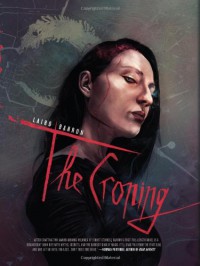 I don't buy many books soon after they come out but Barron is one of those I do, being one of my favourite contemporary horror authors. I approached this with mixed feelings of excitement and trepidation, uneasy at how well Barron would adapt to writing a novel. I need not have worried.
I don't buy many books soon after they come out but Barron is one of those I do, being one of my favourite contemporary horror authors. I approached this with mixed feelings of excitement and trepidation, uneasy at how well Barron would adapt to writing a novel. I need not have worried.Barron draws together, and more thoroughly elaborates on, themes he has touched upon in previous stories to deliver a more complete vision of overarching cosmic horror permeating every facet of our world and yet somehow managing to remain just out of sight for the majority. Our protagonist Doug Miller manages to remain in the dark, despite the entanglements of many of his friends and family due to his occasional memory loss but now events are going to come to head once again and he is due for a renewed bout of clarity.
At times, the build up felt somewhat slow and belaboured with the detailed descriptions of the branches of his extended family, colleagues and acquaintances but in retrospect, much of this was probably necessary for laying the groundwork for what was to come. No doubt I would benefit from a second reading in which I would find clues and indicators as to the nature of the cosmic conspiracy that I simply didn't realise the significance of the first time around.
Barron did not disappoint with his début novel that was superbly well crafted and left me ruminating on its haunting implications that will, no doubt, rattle around my mind for some time to come.
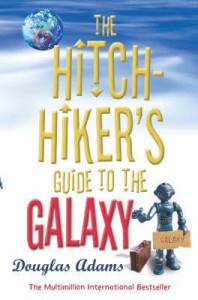
Getting around to reading this classic science fiction comedy has been a long time coming and one reason for this is because I have long been familiar with the story in other forms (such as the old TV series and recent film). I was worried that reading the book (that didn't even originate in book form) wouldn't do much for my appreciation of the story. I was right.
Primarily this book is concerned with playing with the reader's sense of scale, perspective and reality in general. Essentially, life is absurd and there's little to be gained by trying to draw inferences from even the most unlikely of coincidences. Our pursuit of the meaning of life is destined to fail unless we better understand what it is we are trying to achieve.
Don't expect anything along the lines of a conventional plot and characterisation, this is about examining the implications of the cosmic joke. And it's a funny book, the effectiveness of much of which was simply not felt by me on this occasion due to over familiarity. Not the book's fault to be sure, but a problem that interferes with my ability to think objectively about it.
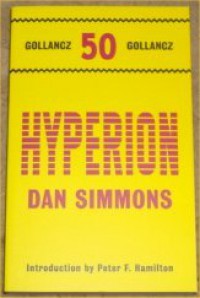 This is one of those SF books that is highly acclaimed, seems to have been read by nearly every SF reader I know, and I have for some reason only just gotten around to it. Well, better late than never.
This is one of those SF books that is highly acclaimed, seems to have been read by nearly every SF reader I know, and I have for some reason only just gotten around to it. Well, better late than never.I wasn't sure how much I would like this because I normally don't go for fat space operas with lots of world building. The only other book I had read of Simmons, [b:Song of Kali|3979|Song of Kali|Dan Simmons|http://d.gr-assets.com/books/1165368440s/3979.jpg|1623747], that, although I thoroughly loved it, was an entirely different kind of book. I have to say however that Simmons tackles this kind of SF with aplomb demonstrating to me that not only is he not a one trick pony, but hat he writes as good or better space opera than many others who make it their speciality.
The book is long because it includes the not insubstantial back stories of six of the seven main characters within. They are pilgrims making their way to the mysterious time tombs on a world that is rapidly becoming the focal point of an interstellar confrontation between forces whose nature only becomes apparent as we hear the pilgrim's stories. The book is long but works because the separate stories are as interesting as the meta story itself and, although wildly different and told by starkly different characters, combine to add new layers of depth and complexity to the book as a whole. It also allowed the author to weave together several different types of SF that are not normally combined in the same story.
It should be pointed out that the book dumps the reader on the edge of a cliff with very little in the way of resolution. It does not, in my opinion, stand on its own. One will need to move on to the sequel to find out how it all works out. However this is undoubtedly an epic and ambitious work that, so far, pretty much achieves what I think the author set out to do.
 The blurb on the cover described this as "A unique mixture of humour and horror", but for me it didn't really fall into either category. Like his other novel I have read, [b:Voice of Our Shadow|42147|Voice of Our Shadow|Jonathan Carroll|http://d.gr-assets.com/books/1169859552s/42147.jpg|968926], it feels only like a straight fiction story until over half way through. There are only the subtlest of hints before then that something is not quite right. Then the bomb drops and we find ourselves in the realms of fantasy.
The blurb on the cover described this as "A unique mixture of humour and horror", but for me it didn't really fall into either category. Like his other novel I have read, [b:Voice of Our Shadow|42147|Voice of Our Shadow|Jonathan Carroll|http://d.gr-assets.com/books/1169859552s/42147.jpg|968926], it feels only like a straight fiction story until over half way through. There are only the subtlest of hints before then that something is not quite right. Then the bomb drops and we find ourselves in the realms of fantasy.Written in the first person perspective, this is the story of a disillusioned school English teacher who takes a sabbatical to write the biography of his favourite author Marshall France. He travels to the deceased Author's home town with his researcher, fellow enthusiast and girlfriend to meet with the author's daughter whom he finds unexpectedly welcoming. At first it all seems idyllic but gradually he finds things aren't quite right...
I really enjoyed this at first but my interest wavered a little in the middle as the story seemed unnecessary drawn out but I liked the way it was wrapped up and all in all it was very good.
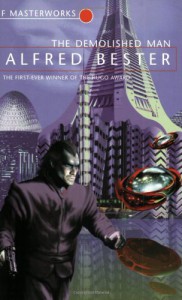 Wow, this felt so fresh and exciting like it could have been written recently only they don't write SF this good any more. Not bad for a novel written some sixty years ago. That's when you know that a book truly deserves to be in the SF Masterworks series.
Wow, this felt so fresh and exciting like it could have been written recently only they don't write SF this good any more. Not bad for a novel written some sixty years ago. That's when you know that a book truly deserves to be in the SF Masterworks series.So, reading through other people's reviews of the book I was surprised to see some people criticise this for being dated. Okay, if one wants to be critical, there were definitely some aspects that were undeniably dated (such as the treatment of female characters) but really, contrast this with most other books written at that time and this comes off rather well.
The central character of this story, the ruthless business tycoon Ben Reich, is fascinating. A terrifying vision of what a single minded man of power might do to consolidate that power, letting nothing stand in his way. When a rival cartel threatens to topple his own cartel's dominance of the markets and an offer of merger is apparently refused, only one option seems open Reich; murder. Not as easy as it sounds when you're living in a society with telepathic police and murder's virtually unheard of. So Reich embarks upon an elaborate yet risky plan where the stakes couldn't be higher, win and he becomes the ultimate mover in the solar system, lose and he faces demolition...
Some people seem to prefer his other famous work, [b:The Stars My Destination|333867|The Stars My Destination|Alfred Bester|http://d.gr-assets.com/books/1298507693s/333867.jpg|1398442], but personally I preferred this one. Both great but this one engaged me more.
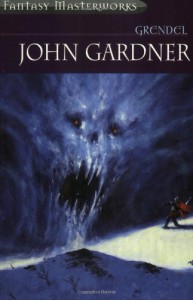 I'm always wary of books that offer a different take on a well known, traditional story but this was done quite well, proving to be not just presenting Grendel's point of view but also his meditation on the meaning of life.
I'm always wary of books that offer a different take on a well known, traditional story but this was done quite well, proving to be not just presenting Grendel's point of view but also his meditation on the meaning of life.Why is it that the stories that offer the best insights into the human condition are usually from the outside looking in? At least it seems that way to me, anyway.
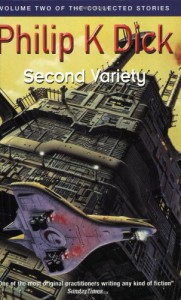 After reading the final part of this five volume set of his chronologically ordered short stories, I fancies dipping into some of his earlier stories this time and so plumbed for volume two.
After reading the final part of this five volume set of his chronologically ordered short stories, I fancies dipping into some of his earlier stories this time and so plumbed for volume two. That these are from his early days as a writer, when he was churning out stories for the magazines by the dozen, is quite apparent . Many of the themes we commonly associate with Dick are to be found in here, often his first experiments with them, so they are of interest for that reason alone if nothing else. But these stories are very obviously written under the early days of the cold war and the prospect of nuclear annihilation is very much on the author's mind.
Many of the stories felt somewhat heavy handed and I could often see the twist a mile off but there were a few gems in here too. "Second Variety" and it's follow up "Jon's World" were both excellent. In a desperate attempt to avoid defeat at the hands of the Soviet Union in a third world war, the American's develop "Claws"; lethal, self replicating and deadly killing robots fuelled only by the desire to wipe out life. In "The Commuter" and "Small Town" we see Dick playing with the idea of shifting realities. In "Adjustment Team" the protagonist stumbles upon a secret benevolent organisation that is behind the scenes attempting to direct the course of human history. And in "The Impostor", we see Dick's first use of "replicants" and exploring the theme of how much one can rely on one's own memories.
All pretty much enjoyable to read but you would leave quite a few out if you were making a best of collection.
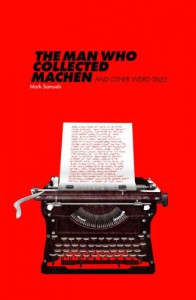 Another fine collection from who is one of the leading lights of modern weird fiction.
Another fine collection from who is one of the leading lights of modern weird fiction.Mark's style really works for me. His prose is clear and concise yet evocative. He writes very consciously of the genre and has a healthy respect for the greats authors that helped shape it. Having some experience of the classic authors yourself, while not essential, will help get the most out of some of these stories here.
Some of the stories centre around writers, such as "Losenef Express" that features a weird fiction writer who is trying to lose himself in eastern Europe whilst ridden with self loathing over his loss of artistic integrity. Then there's "The Age of Decayed Futurity" in which an author looking for ideas for her fourth novel, inspired by the ravings of washed up Hollywood actor, comes to the attention of a global conspiracy to turn us all into mindless zombies.
There are stories about collectors of books such as the title story and "Glickman the Bibliophile" in which a book collecting obsessive is caught and brainwashed by an organisation trying to suck all the information out of the world.
Underlying most the stories seems to be a seething resentment of modern society, it's soulless culture and progress for it's own sake. In this sense he resembles Aickman who held the same view (but made the point more obliquely). Samuuels also seems to feature different malevolent, nihilistic forces at work seeking to undermine humanity and turn us back into the primordial slime, showing similarities with Ligotti. Although perhaps the most Littogian story in this collection (and also my favourite) was "THYXXOLQU" in which the language of the dead begins to invade our society, gradually infecting everyone.
This collection was just such a pleasure to breeze through and I can happily recommend it to any fans of weird horror.
Cat’s Cradle
 I'm starting to detect a common theme in Vonnegut's work; the absurdity of reality and the futility in trying to make sense of it. And realising this, how can we do anything else but laugh?
I'm starting to detect a common theme in Vonnegut's work; the absurdity of reality and the futility in trying to make sense of it. And realising this, how can we do anything else but laugh?This book is a story of one man's conversion to Bokononism which is basically coming to terms with the above and living your life accordingly. It is also an account of an apocalypse in which the invention of a new molecular arrangement of H2O (known as Ice-9) leads to the near obliteration of life on earth.
Some parts of this book made me laugh out loud in public which can only be a good thing. His humour is wry, making light of tragedy but not in a way that belittles it. It's all in the way it's delivered, which I think makes his writing unique.
Don't look too deeply at the science in this book, which surely doesn't bare too close scrutiny, but that's not really the point. Vonnegut is concerned primarily with humanity, using tools from the SF toolbox as needed to make his point.
I'm not a religious person but, after reading this, I can feel the pull of Bokononism.
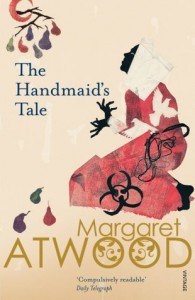 Just after I started reading this book I read this article in the Guardian: My hero: George Orwell by Margaret Atwood. She concluded the article by stating that she wanted to write a dystopia that was from the female point of view. That's exactly what she did.
Just after I started reading this book I read this article in the Guardian: My hero: George Orwell by Margaret Atwood. She concluded the article by stating that she wanted to write a dystopia that was from the female point of view. That's exactly what she did.I find it hard to articulate why exactly but I found the explanation, that is revealed piece meal in the protagonists scattered narrative, for how the new state of society came into being somewhat unconvincing. The story is set so soon after the establishment of the new regime that I found it hard to believe it has achieved such complete and thorough control over the populace that quickly. The ease in which the regime came into power seemed too smooth and clean for me to really buy into it as something that could easily happen.
But putting that aside and focusing on the story of the nameless protagonist, one has to say that this was an effective and scary portrayal of life in a dystopian society in which women have become dispossessed of their long fought for rights. One can really feel for the woman who has lost everything and everyone she loved, and is forced through demeaning and degrading rituals in order just to survive, not to be declared an "unwoman" and shipped off to the colonies.
The excellent ambiguous and uncertain ending was somewhat tempered by an unnecessary (in my opinion) epilogue in which the prior narrative was treated as some discovered historical document being discussed in a historian's lecture.
The author achieved what she set out to do quite effectively but falls short of Orwell's masterpiece [b:1984|5470|1984|George Orwell|http://d.gr-assets.com/books/1348990566s/5470.jpg|153313] that inspired her.
Incredible Adventures
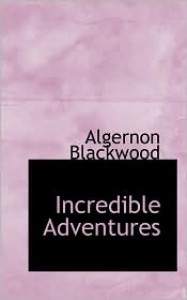 It's been just about long enough to allow myself the pleasure of reading another book by the master of numinous horror, Algernon Blackwood. I picked this book as it is (according to [a:S.T. Joshi|406026|S.T. Joshi|http://d.gr-assets.com/authors/1200469411p2/406026.jpg]) Blackwood's last great collection and also because I hadn't read any of the stories previously.
It's been just about long enough to allow myself the pleasure of reading another book by the master of numinous horror, Algernon Blackwood. I picked this book as it is (according to [a:S.T. Joshi|406026|S.T. Joshi|http://d.gr-assets.com/authors/1200469411p2/406026.jpg]) Blackwood's last great collection and also because I hadn't read any of the stories previously.There's something about his writing that really uplifts me, and never fails to evoke an unsettling atmosphere and mood. Yes, he is very wordy, and some may feel like he belabours the point but in fact it is his technique for effecting gradual and subtle shifts in the narrative and the protagonist's state of mind. His prose style reads easily to modern ears though does feel old fashioned.
There's only actually five stories in this collection, four of which I would actually call novellas more than short stories. They generally share a common theme (that extends throughout his work) of spiritual (re)discovery and Blackwood obviously felt that people of his age had generally lost touch with their more elemental, spiritual natures. He was a theist without holding to any particular creed or doctrine and one gets the impression that he held the rationalist/atheist in equally as low regard as the dogmatic, proselytizing zealot.
"The Regeneration of Lord Ernie" was the opening tale about a professor taking a young heir around the world in order to help him find himself and lose his apathy. Nothing seems to have any impact until they stumble upon some strange cult in the mountains of France that worship the elemental forces of air and fire.
But my favourite of the collection was definitely "The Damned". A haunted house story with a twist. Blackwood masterfully builds up tension and atmosphere in this story and is only let down by too forcefully (I felt) hammering home his world view once again at the end.
Well, that's my fix done for this year...until next time.
Subterfuge
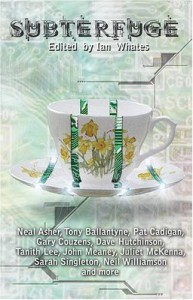 All anthologies inevitably vary in quality and even though I've rated this one five star, there were a few stories I didn't like, but for some reason the theme of subterfuge really works well.
All anthologies inevitably vary in quality and even though I've rated this one five star, there were a few stories I didn't like, but for some reason the theme of subterfuge really works well. Certainly, the contributors interpreted the theme quite broadly, judging by the variety of the stories. Some barely qualifying to be called SF at all in my opinion, occasionally crossing over into fantasy and horror, though not lacking for quality. Tanith Lee's "Multitude" found one of the most unusual ways to combine science and fantasy I have ever encountered. Others, on the other hand, were firmly planted on familiar SF ground (though not lacking in imaginative power), such as John Meaney's "Emptier than Void" and Neal Asher's "Underbrain", Juliet McKenna's "Noble Deceit" and Nik Ravenscroft's "Time, Like an Ever-Rolling Stream".
I would love to see Ian Whates revisit this theme, perhaps with a "Future Subterfuge" anthology? ~nudge, nudge~
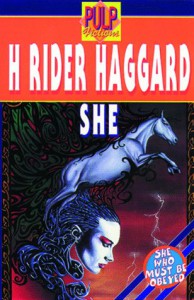 An intriguing fantasy, lost world, adventure story although it does explore some important questions such as the importance of beauty and how much we are driven by ascetics.
An intriguing fantasy, lost world, adventure story although it does explore some important questions such as the importance of beauty and how much we are driven by ascetics.An interesting point of fact about this novel is it is in the first person POV, but not from that of the heroic, good looking protagonist, but rather from that of his grotesquely ugly, adopted father. He rears his adopted son until, in adulthood, he learns about his family legacy that dates back over two thousand years. They then go on a quest to deepest, darkest Africa to try and find out if there is any truth to the legend and whether "She-who-must-be-obeyed" lives on still with eternal youth, and irresistible beauty.
In some ways it presents men in quite a poor light: I don't know how beautiful and irresistible a woman would have to be for you to fall into her arms, immediately forgetting the fact that she just murdered your wife that you apparently were in love with? Although it was somewhat ironic that after she died, he denied himself the chance of immortality, admitting that wouldn't have the patience to wait for a couple of millennia for her return (as she had for him).
There weren't many scenes of action in the book but those there were were extremely well and engagingly written showing that he was a clear forerunner for writers such as [a:Edgar Rice Burroughs|10885|Edgar Rice Burroughs|http://d.gr-assets.com/authors/1207155710p2/10885.jpg] and [a:Robert E. Howard|66700|Robert E. Howard|http://d.gr-assets.com/authors/1210954603p2/66700.jpg]. I think I would definitely like to read more of his work, although I'm not sure what...
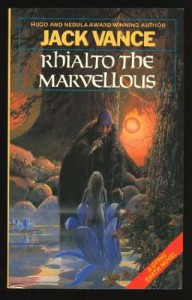 It's taken me nearly three years but I've finally finished reading the quartet of books that make up Jack Vance's classic fantasy series The Dying Earth. Perhaps I might have been better off reading the omnibus but I like breaking up series rather than reading them all in one go. Especially with a series like this in which the stories are only loosely connected.
It's taken me nearly three years but I've finally finished reading the quartet of books that make up Jack Vance's classic fantasy series The Dying Earth. Perhaps I might have been better off reading the omnibus but I like breaking up series rather than reading them all in one go. Especially with a series like this in which the stories are only loosely connected.The series in all comprises of numerous short stories, a novella and two novels. This final book contains the novella and two of the short stories, all relating to "Rhialto The Marvellous" and his cabal of weasley, conniving fellow magicians who are always trying to further their own ends at each other's expense.
Like the other books in the series, the best thing about these stories is the dry humour of the narrative, Vance's clever turn of phrase and the dialogue of the characters. Don't come to these books expecting extensive world building, character development or fast paced action, you'll go away disappointed. But in reading these books, it is easy to see why it has been so influential on the genre.
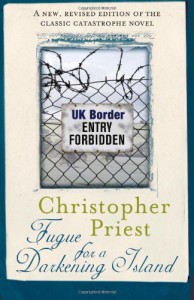 It can be hard for us living in relatively comfortable places like Britain to really relate to and understand people living in war torn African countries where normal society has broken down, the land is split into various factions fighting for control with continuously shifting territories and bands of marauding men are wandering the countryside raping and pillaging as they go leaving countless refugees displaced from their homes with no where to go.
It can be hard for us living in relatively comfortable places like Britain to really relate to and understand people living in war torn African countries where normal society has broken down, the land is split into various factions fighting for control with continuously shifting territories and bands of marauding men are wandering the countryside raping and pillaging as they go leaving countless refugees displaced from their homes with no where to go.So how better to bring this home to people than to literally bring it home in the form of science fiction? Priest envisages the collapse of British society caused by an extremist right wing government's bad handling of a massive influx of African refugees fleeing a nuclear holocaust in their homelands. The country collapses into civil war between the nationalists who want to drive the African illegal immigrants away and those who sympathise with their plight and want to accommodate them. Foreign powers wage war with each other by proxy by supplying one side or the other with weapons, America tries to police the situation and the UN tries to intervene on humanitarian grounds. Chaos and confusion reign.
This is a bleak story, from beginning to end, which parallels the turmoil of the protagonist's external environment with his inner, emotional turmoil caused by breakdown of his marriage. The narrative is highly fragmented, nipping back and forwards in time and so we are gradually able to build up a picture of how the situation unfolded and an insight into the man himself. He is not a particularly likeable character and is both emotionally disconnected from his family and the wider conflict, always feeling like an observer, an outsider looking on.
This is one of Priest's earlier works and quite different from anything else I have read by him. An intriguing, powerful and hard hitting story that is certainly not for the feint hearted.
When the Sleeper Wakes
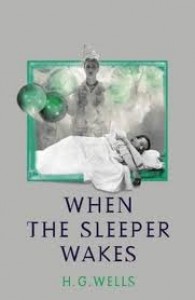 I'm not entirely sure what to make of this book. It certainly has its flaws but there is something about it that I rather enjoyed.
I'm not entirely sure what to make of this book. It certainly has its flaws but there is something about it that I rather enjoyed.Graham falls into a Cataleptic trance for two hundred years (in which he does not age, nor require sustenance of any kind) and awakes into a dystopian society that is on the cusp of revolution. He finds that he has, thanks to compound interest and a committee of shrewd investors, become owner of most of the world's wealth. This committee now effectively rules the world on his behalf but is not so happy about his unexpected re-awakening. Graham gets swept up in a revolution and a violent struggle for power as he attempts to reorient himself to the changed times.
Written in the late nineteenth century, this vision of the future is hopelessly outdated but is more interesting as an insight into the times in which it was written than for it's prophetic qualities. While he does foresee an improved state of equality between the sexes, the racial attitudes on show in this book are quite alarming. The "viscous Negro brutes" are brought in to suppress the white man of England and the N-word is used. I'm usually quite tolerant to the racial attitudes of authors in the past but even I was uncomfortable at times.
The descriptions of the city and environment in which the protagonist finds himself can be quite overwhelming and confusing at times but I suppose this reflects the way the Graham would have felt in the fact of such a changed world.
An interesting story but I can see why it is not among his most well remembered works.



